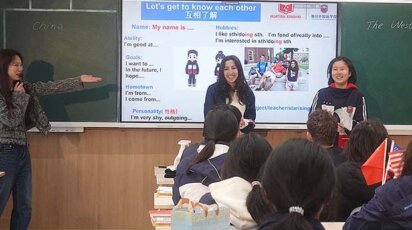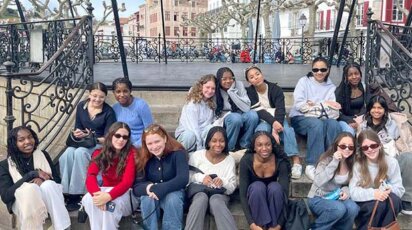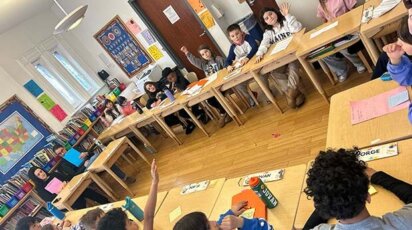News
New York Times Reporter Shares Experiences with Students
“Don’t produce a story you wouldn’t want to read yourself.”
This advice was shared by Pulitzer Prize-winning New York Times journalist Matt Rosenberg, the guest speaker at a meeting with the staff of The Polygon and other interested students and faculty on November 30 in the library.
A veteran foreign correspondent for 15 years in Asia, Africa, and the Middle East, Rosenberg has most recently been part of the Times’ live reporting on the Israel-Hamas war. Rosenberg was part of a Times team that won a 2018 Pulitzer Prize for reporting on Donald Trump.
Brianna Sylvain ’27 and Lucas Basham ’24 moderated the discussion, serving up great questions that stimulated a lively conversation and Q&A. Sylvain is the arts editor of The Polygon. Basham is the breaking news editor for The Polygon and in Rachael Allen’s Advanced Journalism class.
After an introduction by Basham, Sylvain asked Rosenberg why he does what he does. He explained that as a young writer, he “wanted to talk to people and find out about things.” He said that is still a big part of what he does, sitting down and listening to people’s stories.
Scrutiny as Foreign Correspondent
In 2014, while a foreign correspondent for the Times, Rosenberg was expelled from Afghanistan as a result of his reporting. Asked about this by a student, Rosenberg explained he had “been on the list” of Afghan President Hamid Karzai and the final straw was a story that actually appeared back on page A12 in the Times. Rosenberg was called to the Afghan Attorney General’s office and asked to name his sources. He was accused of being a spy. Through colleagues and a translator, Rosenberg realized the Afghans were talking about whether to “arrest him now or wait.” But he was given 24 hours to leave the country.
He discussed the particular difficulty of a journalist covering the current Israel-Hamas war, noting “the level of scrutiny that you rarely see… Everything you do is going to be examined and criticized.”
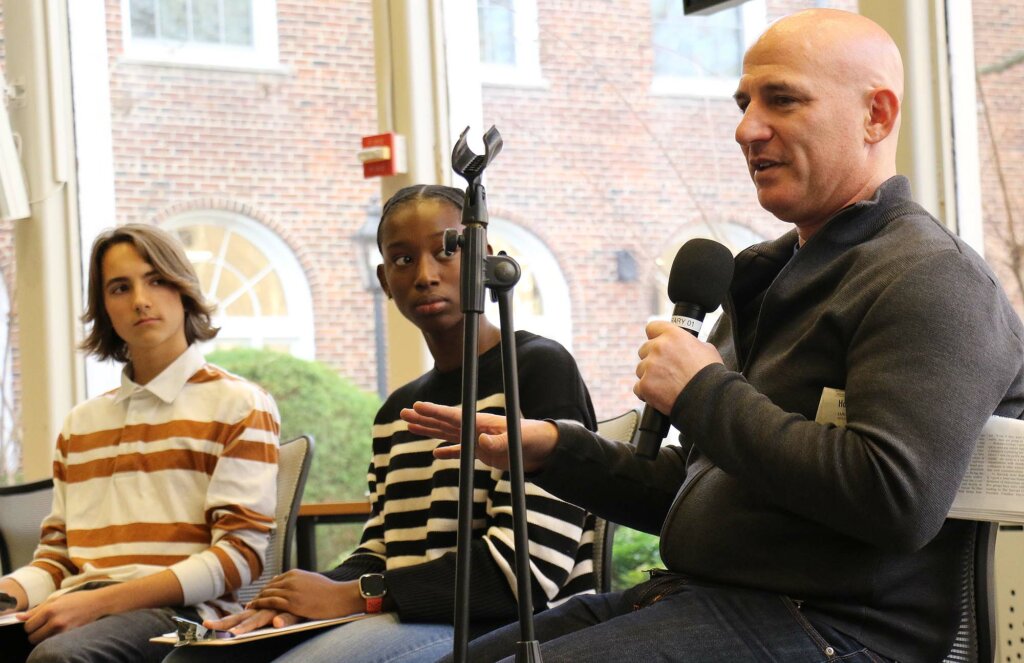
He said that the students may cover “controversial subjects” and so it would be wise to “develop a thick skin.” But he advised, “Listen to critics,” and “learn how to be sensitive to people you disagree with.” He said that he has learned a “great lesson” to be “open-minded.”
“How do you avoid personal bias?” a student asked. “The goal is to be fair,” Rosenberg said. He advised sitting down with an interviewee and asking, “‘What’s your version?’ Allow everyone to have their say.”
Editing and Skill Building
Rosenberg said small newspapers were a great place for reporters to get a start, but “they don’t exist anymore.” He recalled the newsroom when he was a young reporter. Bob McFadden, who won a Pulitzer for his distinguished writing skills, taught Rosenberg the finer points of journalism by yelling at him about a story he had submitted: “I can’t see the fire!” Rosenberg continued, “I’m an easy edit,” and advised the students, “Enjoy being edited. It’s good for you.” He added, “It’s amazing how a deadline focuses the mind.”
Afterward Dov Weinstein Elul ’24 said, “I enjoyed learning about how to deal with editors editing your articles. He said that edits always help even if you don’t think they do and that you should be open to receiving them.”
What was Rosenberg’s advice for students? “Read — it will make you a better writer,” he replied and added, “In college, take microeconomics, macroeconomics, and statistics” to better understand “how statistics work.”
Afghanistan Anecdote
A student asked Rosenberg to share the “craziest story from your travels.” During the 2010 surge in Afghanistan, he said, he was embedded with troops at an outpost that was half American and half Afghan. Taliban attacks were common and he would have to take cover often. At one point, he hadn’t had a cup of coffee in four days and finally acquired one when there was another Taliban attack. But Rosenberg was determined not to give up his coffee and so ran with the cup. He had to hit the deck, spilling the hot coffee on his leg. Someone yelled,”Medic, man down,” but it turned out that his only injury was to his pride and coffee-related. Colleagues did not let him forget this incident for a long time.
Misinformation, Building Trust, and Outlook
Rosenberg addressed the problem of disinformation and the challenges of AI in journalism. He advised, “When you see something, look who is providing the information. There is a ton of misinformation. Check the source.” In the digital news business, “As things are happening, we are writing about them.” Get as many sources as you can and learn “what you can trust and what you can’t.”
Rosenberg said that if you give people a heads up about a upcoming tough story about them, they appreciate it. “People prefer to be stabbed in the face rather than the back.” He added, “People will still talk to you if you are honest.”
“When do you decide a story is done?” a student asked. “When I run out of time, it’s done!” On a feature, he may go back and forth with his editor. He keeps tweaking until the editor locks him out of the story.
Asked about what he sees as the future of the profession, Rosenberg said, “It’s going to be different.” He added that AI will “provide a set of tools that will be incredible.”
“Why do it?” a student asked Rosenberg about his chosen profession. He answered that the hope was to “effect real change.” But he added he didn’t expect “just how polarizing people see us.”
“How do you maintain faith in humanity?” someone asked.
“You do also see happy things,” Rosenberg assured them.
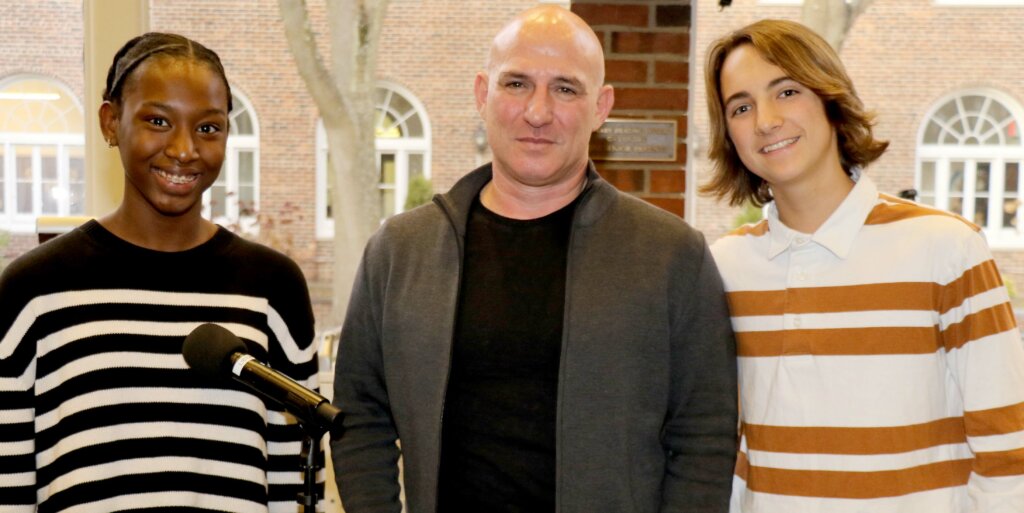
Takeaways
How will Polygon staffers use what they learned?
Hearing about his experiences,” Basham said, “has furthered my interest in becoming a journalist and foreign correspondent because, for one, it has contributed to the person he has become, but also because it does contribute to real social change. Most of his stories aren’t making some sort of crazy difference in the world, but those few that do mean a lot. He has also had some crazy, fun, and memorable experiences.”
Elul added, “He talked about learning from people who are totally different from you and understanding their perspectives, which seemed super interesting to me and a fascinating job. But the dangers for me outweigh the reward. Except what he was saying is exactly what I like about journalism—being professionally curious and learning about and telling cool stories.”

